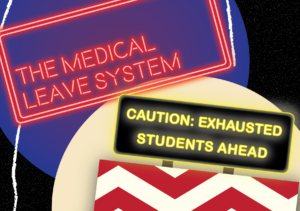Last month, my day often started with sharing an understanding smile with the Lau security guard. If you’ve stumbled into the library anytime from 5-8 a.m., determined to study for an exam that day or desperately wrapping up the final touches of a paper, you may have also found me there, dark circles under my eyes from just four or five hours of sleep and a big mug of hot coffee with a splash of whole milk in front of me. As someone who always yearns to add some color into my life, a variety of colored highlighters would have been set on the table to help get me into the studying mood.
Going to Lau at 5 a.m. to study, and still managing to remain relatively peppy and cheerful during the day, used to be something I was rather proud of. I believed it signaled that I was hardworking and taking my commitments seriously. I was pushing myself to become a better student and doing the most I could. Yet more and more, I came to realize that I was sliding down a slippery slope toward an subconscious drive for perfection.
Running back and forth from my room to the library on the weekdays, getting four to six hours of sleep a night, drinking two cups of coffee in the mornings, and continuously feeling tired and overwhelmed was not healthy, productive, or sustainable. It was stressful and absolutely detrimental to my mind, body, and spirit. Even though I am a student who genuinely loves my classes, I now see that as my stress levels peaked, my innate desire to learn waned. Instead, I succumbed to “survival” mode just to keep afloat, a state of mind I found rather dehumanizing. Of course, I recognize that there are other structural elements at play here. For example, many students, perhaps due to juggling work and school, may not always have the luxury of opting out of this lifestyle.
I spent my freshman year at a small, liberal arts college in rural Maine. While I am grateful to be at Georgetown and have met incredibly active and passionate spirits, I had more time at my previous institution to think, slow down, and sleep. I did not feel as pressured to be perfect and do it all. Georgetown propels the idea that “busyness” is associated with a good, successful, and meaningful life. Sometimes, I find it absolutely bizarre that so many Georgetown students seem to have their whole life plans figured out, with status, prestige, and financial stability as added bonuses. How can so many 18- to 22-year-olds possibly know what will make them happy in the long-term? I know that I’m not the only one who does not have my entire life figured out. But at Georgetown, it seems as if this uncertainty puts me at a disadvantage. However, I’ve realized that indecisiveness is part of the beauty of being 20 years old. I am learning about myself by not restricting myself to one limited path or field of interest. Besides, isn’t a major purpose of college to learn, explore, take risks, and make mistakes?
Even though we may not think about this every day, chances are many students only have these four undergraduate years to fully devote themselves to learning from professors who are experts in their fields and living among unique and brilliant peers. Shouldn’t we be cherishing this opportunity? Shouldn’t we be spending more time cultivating healthy relationships with friends and having meaningful conversations? Shouldn’t we be taking classes because we find them interesting and genuinely want to embrace challenges and learn something new, rather than being worried that a particular class might tank our GPA? Too soon, our college years will be over. That’s why we should be striving for imperfection instead.
Last summer, I read a book by Carol Dweck called Mindset: The New Psychology of Success that completely changed the way I approach life. Dweck’s research discusses the difference between the “growth mindset” and the “fixed mindset.” When individuals have a growth mindset, they see challenges and failures as opportunities to grow and believe that effort leads to success rather than ability. In contrast, when individuals have a fixed mindset, they tend to believe that failure reflects their ability and limitations, and, as a result, will shy away from challenges that will force them to make mistakes and at times fail.
I am a strong proponent of the growth mindset mentality, as I have learned the most from my failures. But while achievements are certainly important, having a growth mindset must consist of improving as an entire person, not just as an individual with a brain, textbook, and a highlighter, or as a student who leads five different clubs at once. We are not mindless robots, but living, breathing beings with thumping hearts, capable of feeling and expressing emotion, falling down and getting back up again with resilience.
I know that I will still be on the third floor of Lau early in the mornings during stressful times because that is when I happen to do my best work. But these days, I strive for seven to eight hours of sleep each night and go to the library only after I feel adequately well-rested and have fixed myself a hearty breakfast. Instead of drinking coffee, I drink green tea. Rather than forcing myself to be “on the go” when I am overwhelmed, I stop, acknowledge how I am feeling, take a deep breath, and assure myself that everything will be okay. I hope regardless of circumstance, everyone can incorporate small acts of self-care into their days.
Sometimes I call a family member or friend to let them know how I am feeling and what I am struggling with. Allowing yourself to be imperfect is easier said than put into practice. Stress culture is a reality, and we should have more dialogue about its relationship with mental health and self-care on our campus. Additionally, there needs to be greater accessibility and awareness of the resources, like Project Lighthouse, that are available for students who need psychological support. Also, by being more vulnerable and open when communicating to our friends, peers, and professors about mental health, we can work together to build a positive, emotionally supportive environment where we encourage each other to make mistakes, learn, and grow.
I am currently reading War and Peace. As I read, I continuously compare and contrast two characters of a similar age, Sonya and Natasha. Sonya appears to be a perfect character who continually does the right thing and feels a strong responsibility to uphold her reputation as one who serves others. On the other hand, Natasha is imperfect, making one mistake after another and getting herself into heaps of trouble. Toward the end of the novel, Sonya fades into the background and remains a stagnant, uninteresting character while Natasha, who is always adapting, learning, and changing, shines. All students should know that part of developing, obtaining depth as human beings, and living a worthwhile life lies in being imperfect and making plenty of mistakes. Maybe we could all try to be a bit more like Natasha.






